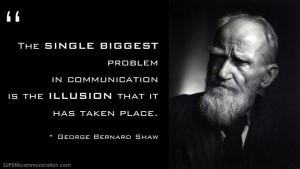So why would I need 12 principles on leadership communication?[1] Consider the new realities of communication: 
- The speed of modern communication is on a global scale today;
- The increased channels of communication, there are more options than we have ability to engage them;
- There is a rise of consumer/citizen power of influencing dialogue without complete factual understanding of the issues;
- There is a rise of expectations for all stakeholders that need a “speedy” response;
- New formations of communities of interest that is being enabled by digital technology and a new sense of empowerment;
- Increasing regulations and the resulting need for new communication requirements;
- The aggressive pursuit of informational journalism and the “tabloidization” of business reporting;
- Declining levels of trust in business that is being accelerated by financial difficulties in today’s marketplace.
Armed with this new reality, a leader is faced with a daunting task on how to stay ahead of the communication curve to LEAD in the context of these new realities as opposed to reacting. Add to this reality this probing question; “When was the last time that you invested in yourself to enhance your communication skills?” Beyond Toastmaster’s or a Dale Carnage course, where would you go to learn more on effective speaking? Intentionality is the one key word that we postpone. The danger is that postponing anything in our life assumes that we are in control of our tomorrows. Reality states that we have only this moment and that the journey of 1,000 miles begins with the first step – TODAY!
For the most part all leaders are clear that leadership communication is about inspiring others to achieve great things. Author Murray sets forth 12 principles of communication:
- Learn how to be yourself, if you aspire to being a better leader and communicator.
- Give voice to a compelling mission and powerful set of values.
- Combine this with a vivid picture of the future, which you communicate relentlessly to drive behaviors in the present.
- Keep your people focused on the key relationships that your organization depends on for success and make building trust in those relationships a priority.
- Make engagement a strategic goal, and use conversations to engage.
- Become a fanatic about understanding audiences before trying to communicate with them.
- Listen in new and powerful ways, and learn to ask the right questions.
- Prepare a potent point of view to communicate your messages.
- Use more stories and anecdotes to inspire the right behaviors.
- Be aware of the signals you send beyond your words.
- Prepare properly for public platforms – your reputation is at stake.
- Learn, rehearse, review, improve – always strive to be a better communicator.
Would you take a minute and leave a response below to the question; “What is the most important communication lesson you have learned?” I am eager to learn myself and you can help teach me!
[1] Kevin Murray, The Language of Leaders. Kogan Page: Great Britain, 2012
Please note: I reserve the right to delete comments that are offensive or off-topic.